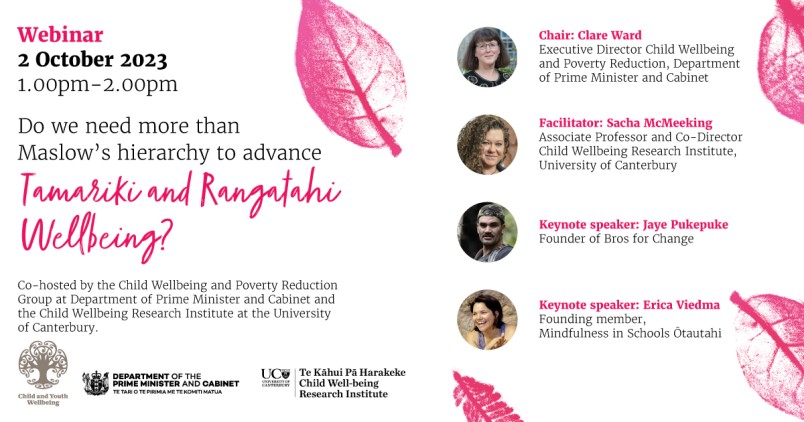
The Child Wellbeing and Poverty Reduction Group at Department of Prime Minister and Cabinet and the Child Wellbeing Research Institute at the University of Canterbury are hosting a joint webinar on Monday 2 October from 1pm-2pm.
Nationally, strengths based, locally led initiatives are contributing significant gains for tamariki and rangatahi wellbeing. While there is recognition that positive outcomes are being generated by such practices, more analysis is needed across successful transformation that aims to unpack commonalities in how and why change is occurring.
This webinar will provide insights of value to community, government and academic sectors by exploring the change mechanisms underpinning two very different approaches to uplifting child and youth wellbeing, with a particular exploration of how we need to evolve our thought processes beyond Maslow’s hierarchy of needs.
The panel will be chaired by Clare Ward Executive Director, Child Wellbeing and Poverty Reduction Group and facilitated by Associate Professor Sacha McMeeking, Child Wellbeing Research Institute. It will explore some of the transferrable insights for those engaged in child and youth wellbeing.
Join us and register for this webinar here.
More about the presenters and their work
Chair: Clare Ward
Clare holds two Executive Director positions within the Department of the Prime Minister and Cabinet, one being the Strategy Governance and Engagement Group, and the other, Child Wellbeing and Poverty Reduction Group. Originally from England, Clare has a background in strategy, policy, research, programme development, monitoring and investment management in the public sector both in New Zealand and in the UK.
The Child Wellbeing and Poverty Reduction Group reports to the Minister for Child Poverty Reduction and supports work to reduce child poverty and improve child and youth wellbeing.
Facilitator: Associate Professor Sacha McMeeking
Associate Professor Sacha McMeeking will facilitate this session and explore the transferrable insights for those engaged in child and youth wellbeing. Sacha is a Co-Director with the Child Wellbeing Research Institute at the University of Canterbury. Her research focuses on generating insights for policy makers and practitioners to amplify and accelerate wellbeing outcomes. She has been an instrumental contributor to the development of He Ara Waiora, the mātauranga Māori wellbeing framework adopted by The Treasury.
Keynote speaker: Jaye Pukepuke
Former New Zealand Māori and New Zealand Rugby League player Jaye Pukepuke is the founder of Bros for Change. The purpose of Bros for Change is to give young people who have been labelled as difficult and challenging, a second chance to create real change through real talk with real people. Bros for Change was established to create self-esteem, self-awareness, self-respect and self-management and role models for the next generations from young people in intermediate school right through to more serious youth offenders. As a catalyst for positive change ensuring everyone reaches their full potential, regardless of their background, Bros for Change uses a strong sense of culture and identity to form the basis of its programme. By using the protocols of Te Ao Māori the programme helps to break down barriers and build strong relationships through encouraging respect for both the participants and the facilitators.
Key note speaker: Erica Viedma
Erica Viedma is founding member of Mindfulness in Schools Ōtautahi (MSŌ). MSŌ was founded in response to a need for wellbeing tools for our tamariki, particularly in response to the Christchurch earthquakes. The feedback was that the mindfulness lessons had a direct impact on soothing the stress of both students and teachers. Years later, the need for wellbeing tools in schools has only become greater arising from further large scale stressor events as well as tamariki facing any number of personal difficulties at home and at school. MSŌ delivers evidence based stress reduction practices and exploring ways to cope with life’s difficulties.